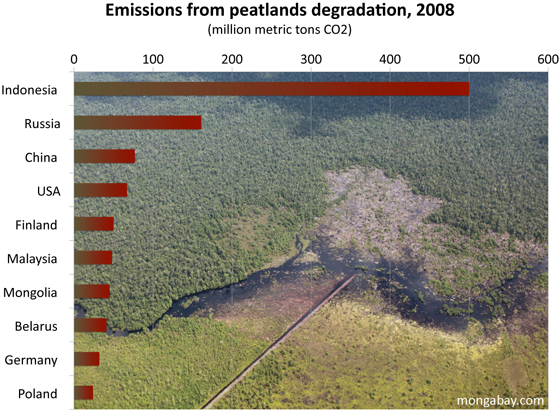Britain will contribute £50 million ($80m) towards efforts to reduce greenhouse gas emissions in Indonesia, including a project that aims to encourage palm oil producers to establish plantations on degraded lands instead of in place of rainforests and carbon-dense peatlands, reports BBC News.
The contribution comes under the government’s £1.5 billion ($2.4 billion) commitment to $10-billion-per-year aid package pledged by industrialized countries during last month’s climate talks in Copenhagen. The money will help fund climate change mitigation and adaptation activities in developing nations. Roughly $3.5 billion of the sum, will, over the next three years, go towards reducing emissions from deforestation and degradation (REDD), a scheme that aims to fight climate change by protecting rainforests.
Britain’s Department for International Development (DFID) said the partnership with Indonesia will support land use planning to encourage sustainable management of peatlands and forests; provide long-term credit access to developers who establish plantations on degraded lands, rather than in natural forest areas; and fund research into the value of Indonesian ecosystems as living entities.
“The impacts of unchecked deforestation in Indonesia will be felt across the world for years to come,” said DFID Secretary Douglas Alexander in a statement. “Through this partnership the UK will stand side by side with the Indonesians to help manage their forests, protecting this vital resource for future generations.”
Indonesia has the world’s second highest deforestation rate but the largest emissions from deforestation and degradation. Conversion and burning of forests and peatlands amounts to 500 to a billion metric tons of carbon dioxide emissions in some years.
Indonesian government report recommends moratorium on peatlands conversion
(01/19/2010) A study issued by Indonesian government recommends a moratorium on peatlands conversion in order to meet its greenhouse gas emissions target pledged for 2020, reports the Jakarta Post. The report, commissioned by the National Development Planning Agency (Bappenas), says that conversion of peatlands accounts for 50 percent of Indonesia’s greenhouse gas emissions but only one percent of GDP. A ban on conversion would therefore be a cost-effective way for the country to achieve its goal of reducing carbon emissions 26 percent from a projected baseline by 2020. But the recommendation is likely to face strong resistance from plantation developers eager to expand operations in peatland areas. Last year the Agricultural Ministry lifted a moratorium on the conversion of peatlands of less than 3 meters in depth for oil palm plantations. Environmentalists said the move would release billions of tons of carbon dioxide.
Limit palm oil development to lands that store less than 40 tons of carbon/ha – study
(08/06/2009) A new study finds oil palm plantations store less carbon than previously believed, suggesting that palm oil produced through the conversion of tropical forests carries a substantial carbon debt.
